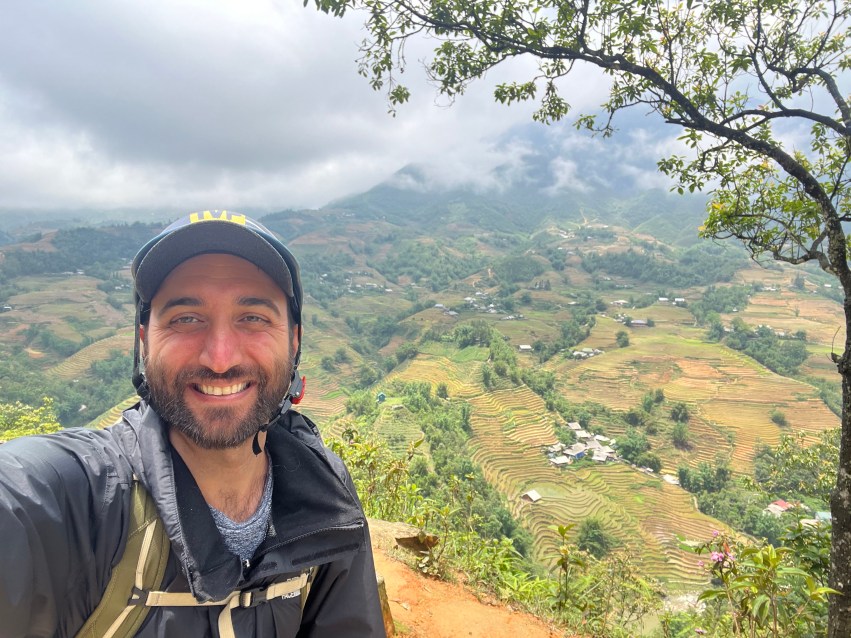By: Pat Yoder, Senior Vice President of Credit
At Tala, we recently launched a five-week sabbatical program for employees who have been with the company for five years — internally known as 5 for 5. The program aims to give tenured employees an opportunity to take some paid time off from work to use as they please, whether that be developing a hobby, diving into a passion project, or, as I did in my case, traveling. I had the honor of being the first Talazen to take their sabbatical. I used the time to backpack through Southeast Asia, and I’d like to share some of my reflections from what was by far the longest break from work since beginning my career.
When it came time to choose how I’d use my five weeks, traveling was the easy answer. I, like many others, have always enjoyed exploring new places and experiencing new cultures. With the pandemic having limited international traveling opportunities for a few years, this type of trip was the clear choice for me. From the instant my plane touched down in Taipei as part of a two-day layover en route to Bali, I was filled with a familiar feeling of adventure, wonder, and excitement for what was to come from past traveling experiences, albeit on a larger scale given the duration of this trip. During the next several weeks, I was fortunate to traverse through four countries and explore their natural beauty, spend time with great company — both familiar and new — eat delicious food, challenge myself both physically and mentally, and relax, simply enjoying the opportunity to take a pause. I also left my trip having learned a few tangible lessons that I plan to take forward:
Plan well, but stay flexible
As I prepared for five weeks of travel, I knew having at least a loose plan in place was important. I managed to find a balance between having a general structure — flights, accommodations, larger excursions — while leaving enough time for ad-lib exploration. I anticipated this trip for months. What few plan for, nor look forward to, however, are the various bouts of adversity that come with travel — whether that is being stranded due to a broken moped, a minor bout of swimmer’s ear, or miscommunication causing you to think a laundromat lost your clothes, which all occurred during my trip. While these incidents weren’t majorly disruptive, each represented an opportunity to either be frustrated or to choose to accept these realities and move forward. Adversity is inevitable in life, even while on vacation. How we respond and learn from it determines our happiness and prepares us for the future. Changes in plans often provide new opportunities for awesome experiences; when my moped broke down in the hot sun, an elderly Balinese man generously invited my friend and me to sit in the shade on his patio. While waiting for the bike repair, we enjoyed food and conversation with a beautiful village view, making for a wonderful “zoom-out” moment as I was grateful for his display of kindness.
Perspective matters
During the four days I spent in Sapa, Vietnam, it rained 90% of the time, making for some wet and cold trekking with limited views due to the clouds. As my trekking guide pointed out the cracks in the earth amid the rice paddies and noted the region was in the midst of a drought, any temptation on my behalf to gripe about the weather was eliminated. How could I complain about a bit of rain when these communities sorely needed it? A simple shift in my perspective turned any irritation into gratitude for the rain nourishing the crops and for my ability to trek those days and meet amazing people while staying relatively dry thanks to the poncho my homestay graciously provided me.
“Don’t let yesterday get in the way of today”
This quote from Ted Lasso highlights the importance of being present. During my time in Ubud, Indonesia, I was able to spend a few days focused on learning more about meditation, yoga, and the overall practice of mindfulness, of which I’d describe myself as very much a beginner. One specific concept from a guided meditation session that resonated with me regards appropriately acknowledging the past yet not letting it control your present. While we should certainly remember and learn from our past experiences, we should do our best to avoid any feelings of regret or rumination; they aren’t productive and hinder enjoying the present and what is yet to come.
I hope you enjoyed reading about my sabbatical. It felt amazing to be able to travel like this again and return with a few lessons I plan to apply in my daily life as best I can. Finally, I’d like to end with a note of gratitude — for the opportunity Tala gave me to take this time and, in a broader sense, for many other things in life.
